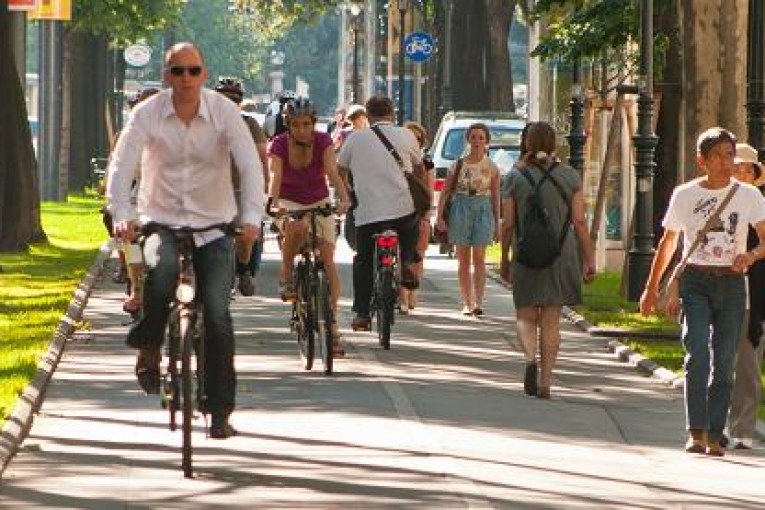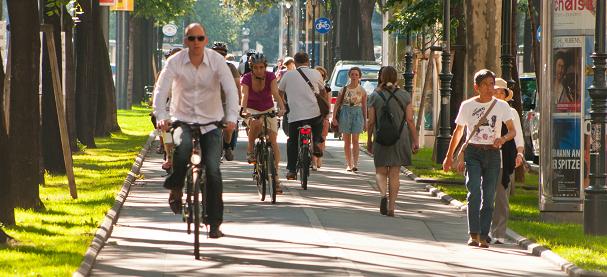

SB 922 accelerates approvals of light rail, rapid bus, bike and pedestrian projects and allows infrastructure funds to be deployed more quickly
Special to the Vanguard
Sacramento, CA – SB 922 was passed on Monday by the State Assembly. SB 922 extends and improves upon Senator Wiener’s previous legislation (SB 288, 2020) to expedite bike, pedestrian, light rail, and rapid bus projects by exempting these environmentally sustainable projects from the California Environmental Quality Act (CEQA). SB 922 will accelerate approval of sustainable, climate-friendly transportation projects.
It now heads to the Senate for final sign off before going to Governor Newsom’s desk.
Given recent historic infrastructure investments at the federal and state levels, SB 922 will help us get projects up and running in record time. This is an important moment to quickly and decisively make use of transformational funds and expand our transportation infrastructure across the state. We cannot allow sustainable transportation projects to get bogged down in years of unnecessary and expensive administrative delays when we could be revitalizing California’s transportation landscape now.
“We can and must make it easier and faster to build sustainable transportation projects that help get people out of their cars,” said Senator Wiener. “Increasing walking, biking and public transit options is a great way to reduce carbon emissions and improve the livability of our communities. SB 922 will streamline these projects so we can get them done more quickly.”
In the short time – just 18 months – that SB 288 has been in place, 15 projects have been streamlined in various parts of the state. Another 20 projects are currently under consideration for streamlined treatment. Transit agencies from around the state, including the San Francisco Municipal Transportation Agency, the Los Angeles Department of Transportation, AC Transit, and CalTrain, have invoked this streamlining. Other transit agencies that have made use of SB 288 include: Yuba-Sutter Transit, Tahoe Transportation District, Napa Valley Transportation Authority, Santa Rosa CityBus, Fairfield and Suisun Transit, Monterey-Salinas Transit District, Culver City CityBus, Long Beach Transit, and Riverside Transit Authority. Streamlined projects include protected pedestrian walkways and bike lanes, bus rapid transit projects, electric vehicle charging for buses, and more.
Without an extension of SB 288, these projects may no longer be viable for these agencies. Whether it’s the significant time and cost to work through CEQA, or the concerns around possible years-long lawsuits and appeals, without this statutory exemption, California will miss out on the necessary changes we need to reduce emissions and provide sustainable transportation options for communities across the state.
SB 288 sunsets on January 1, 2023, and SB 922 will extend this law for seven years, so that cities and counties across the state can continue to cut down on approval time and costs for sustainable transportation projects. SB 922 will also modify the types of projects eligible for streamlining.
Specifically, projects that apply must now meet one of the following requirements:
- Make streets safer for walking and biking
- Speed up bus service on streets
- Make it possible to run bus service on highways
- Expand carpooling options
- Build new, or modernize old light rail stations
- Support parking policies that reduces drive-alone trips & congestion
- Improve wayfinding for people using transit, biking or walking
Additionally, to ensure that the exemption is not misapplied to projects with detrimental impacts, these projects must also:
- Be located in an existing public right of way
- Must not add new auto capacity
- Must not demolish affordable housing
- Must use a skilled and trained workforce or have a project labor agreement in place.
SB 922 will also ensure California invests in equitable transportation projects. In cases where projects are estimated to cost over $100 million, the lead agency or project sponsor must expand public participation requirements so they occur early in a project when input can be most meaningful. They also must complete a project business case to evaluate benefits and costs so communities can shape the project early in the planning. And finally, a lead agency or sponsor must complete racial equity and displacement analyses and suggest mitigations to address any disproportionate impacts.
Building more sustainable transportation is key to addressing climate change and environmental concerns. When more people use alternatives to cars – like transit, walking and biking – greenhouse gas emissions go down. Projects like these will ensure that investment in our infrastructure and economy doesn’t come at the expense of our environment, and in fact helps lower carbon emissions and lessen our cities’ carbon footprint.
CEQA is an environmental law that requires state and local agencies to evaluate and disclose the significant environmental impacts of projects they approve and to avoid or mitigate those impacts if possible. The evaluation is the basis for many state and local approvals needed to deliver a sustainable transportation or public transit project. CEQA is a critically important law for protecting the environment from projects – such as refineries – that pollute natural resources and jeopardize health, especially for historically marginalized and underserved populations. However, each step of the CEQA process is subject to appeals and lawsuits that can increase project costs and create delays. It’s not unusual for it to take three to four years and millions of dollars to resolve a single lawsuit, while appeals regularly take six months to resolve. When CEQA is misused as a tool to delay or halt critically needed projects, it has real consequences for California – making it more difficult to build the sustainable transportation projects that will result in a safer, healthier, and more equitable future for all Californians.
SB 922 is sponsored by SPUR, the Bay Area Council, LA Metro, the California Transit Association and the Silicon Valley Leadership Group. Assemblymembers Laura Friedman (D-Glendale) and Devon Mathis (D-Porterville) are principal co-authors of SB 922, and Senator Josh Becker (D-San Mateo) and Assemblymembers Tasha Boerner Horvath (D-Encinitas) and Phillip Chen (R-Brea) are co-authors.





